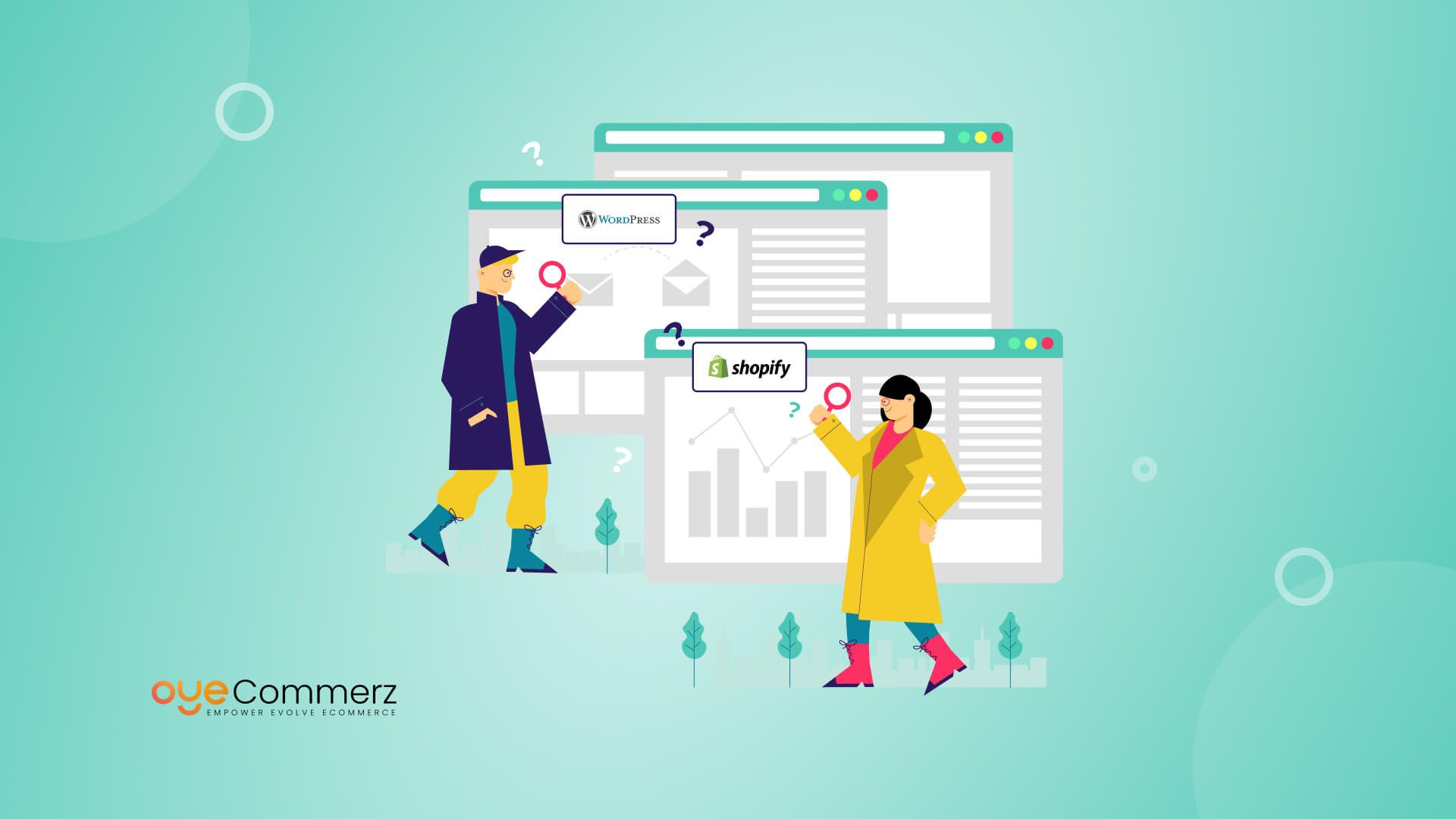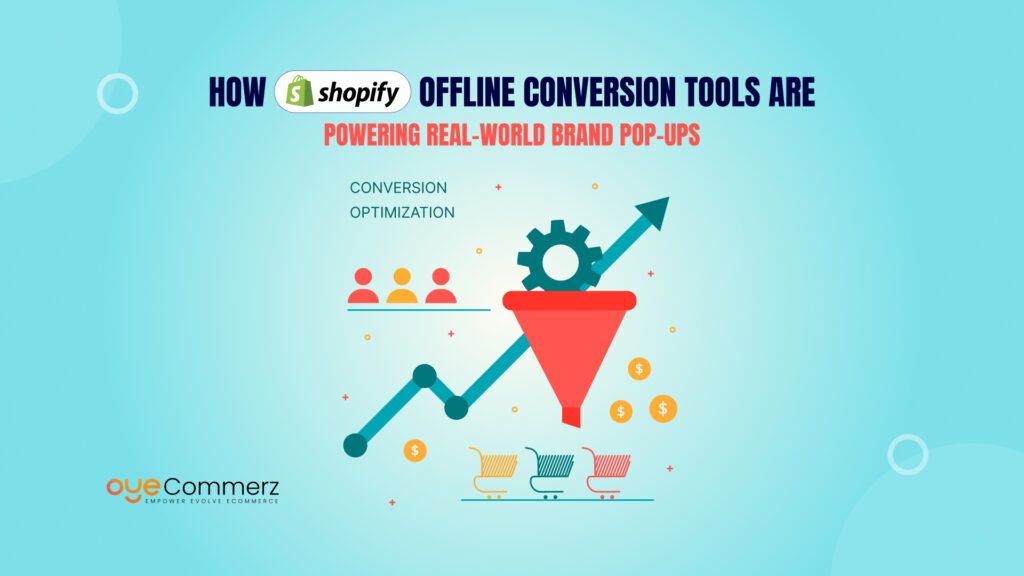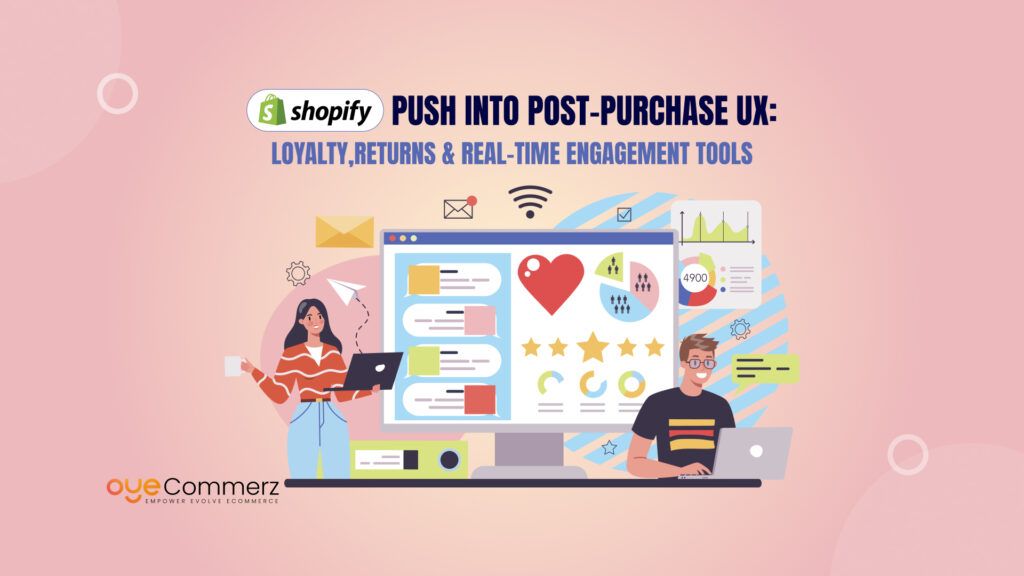Are you a website owner wondering which platform can help your online website stand out in search results? The truth is, choosing the right platform can make a big difference. In fact, businesses that invest in the right SEO practices see an average increase of 40% in organic traffic within just six months! But the real question is: Which Platform WordPress vs Shopify SEO give your business website the edge it needs to boost its online visibility? Let’s find out.
Table of Contents
ToggleWhat is SEO and Why is It Important?
What is SEO?
SEO stands for Search Engine Optimization. It’s the process of making your website better so that search engines like Google can find it easily and rank it higher in search results. The higher your website ranks, the more likely people will find it when they search for things related to your business.
SEO has three main parts:
- On-Page SEO: This includes things you can change on your website, like making sure your content, images, and URLs are all optimized with the right keywords (words people are searching for).
- Off-Page SEO: This focuses on improving your website’s reputation and authority through backlinks (links from other websites that point to yours) and social media mentions.
- Technical SEO: This is about making sure your website works well behind the scenes. It involves things like making your website fast, mobile-friendly, and easy for search engines to crawl and understand.
Why is SEO Important?
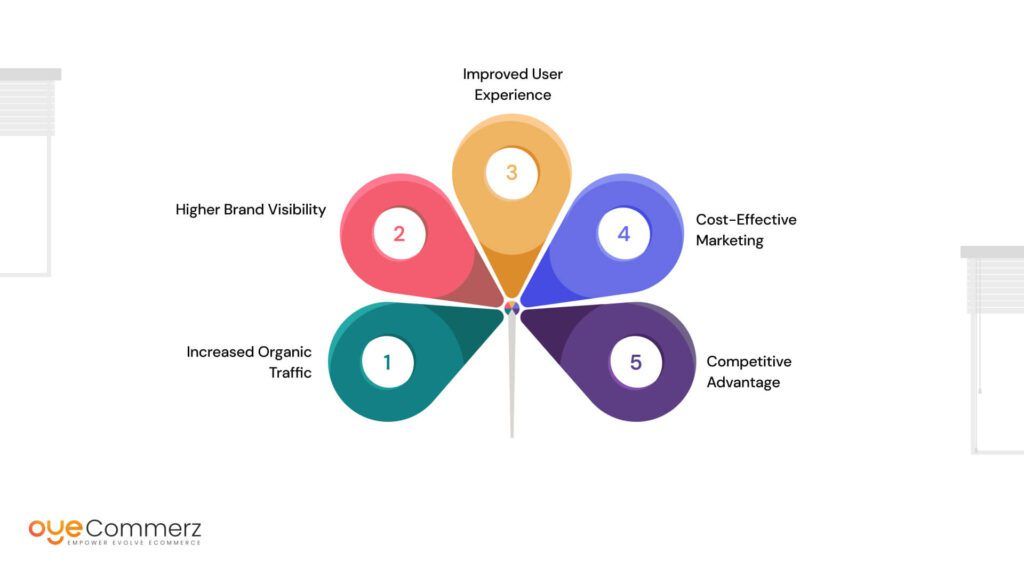
- Increased Organic Traffic: Good SEO helps your website show up in search results, bringing in more visitors without having to pay for ads.
- Higher Brand Visibility: When your website ranks higher, more people see your business. This boosts your brand’s visibility and helps build trust with potential customers.
- Improved User Experience: SEO makes your website easier to use by improving its speed, making it mobile-friendly, and organizing content in a way that’s easy to navigate. This leads to a better experience for visitors.
- Cost-Effective Marketing: Unlike paid ads, SEO doesn’t require ongoing costs. Once your website ranks well, you can continue getting traffic without having to pay for it every time, making SEO a long-term, cost-effective strategy.
- Competitive Advantage: Having strong SEO means you’re more likely to outrank your competitors in search results, giving you an edge in the market and helping you attract more customers.
WordPress SEO: Strengths and Challenges
Strengths:
- Customizability with SEO Plugins
WordPress offers powerful SEO plugins like Yoast SEO and RankMath, which make it easy to optimize your website without needing technical expertise. These plugins help you manage key SEO elements such as title tags, meta descriptions, and focus keywords, and they provide helpful suggestions to improve your rankings. - Flexibility in Creating SEO-Friendly Content
WordPress is particularly strong when it comes to content creation. With its flexible post and page creation features, you can easily create SEO-friendly content such as blogs, landing pages, product descriptions, and more. You have full control over content formatting, keyword usage, and internal linking, which are crucial for SEO success. - Full Control Over Technical SEO Aspects
One of the biggest advantages of WordPress is the level of control it gives you over technical SEO. You can easily customize your website’s URL structure, set up redirects, manage sitemaps, and even optimize the code of your site. If you’re familiar with technical SEO, you can fine-tune your website to achieve maximum search engine visibility.
Challenges:
- Requires Technical Know-How to Fully Optimize the Site
While WordPress offers a lot of control, it also means you need some technical knowledge to take full advantage of its SEO capabilities. Optimizing your website for SEO can involve tasks like editing your website’s code, configuring plugins correctly, and setting up the right redirects, things that might require an expert if you’re not familiar with web development. - Performance Issues with Poorly Optimized Themes or Plugins
WordPress allows you to choose from thousands of themes and plugins, but not all of them are optimized for SEO. Some poorly designed themes or outdated plugins can slow down your website or cause conflicts that hurt your SEO performance. Ensuring your website loads fast and runs smoothly requires regular maintenance and optimization. - Potential SEO Risks with Frequent Updates or Third-Party Integrations
WordPress sites often require updates to plugins, themes, and the WordPress core itself. While updates are important for security and performance, they can sometimes cause conflicts or break SEO settings. Third-party integrations, like apps or tools that add new features, can also introduce SEO risks if not properly maintained or configured.
WordPress offers great flexibility and control over SEO, making it ideal for businesses that want to fine-tune their website for maximum performance. However, it also comes with challenges, especially for beginners, and requires regular maintenance to ensure your site stays optimized and free of technical issues.
Shopify SEO: Strengths and Challenges
Strengths:
- User-Friendly Interface with Built-In SEO Tools
Shopify makes SEO simple, even for beginners, with its built-in tools. You can easily edit title tags, meta descriptions, and alt text for images critical elements for SEO. It also automatically generates sitemaps, helping search engines crawl your site more efficiently. These user-friendly features make it easy to get started with SEO without needing to dive into complex settings. - Fast Load Times and Secure Hosting
Shopify provides fast load times and secure hosting by default, both of which are important for SEO. Page speed is a key ranking factor, and a slow site can hurt your rankings and user experience. Shopify’s optimized hosting ensures that your site loads quickly, improving both SEO scores and customer satisfaction. - Mobile Responsiveness
Shopify’s themes are automatically mobile-responsive, meaning your site will look good and function well on any device. Since Google uses mobile-first indexing, meaning it prioritizes the mobile version of a website for ranking, having a mobile-friendly site is essential for strong SEO performance.
Challenges:
- Limited Customization Compared to WordPress
Shopify is designed to be easy to use, but this simplicity comes with some limitations when it comes to customization. While you can optimize basic SEO elements, Shopify doesn’t offer as much flexibility as WordPress in terms of customizing your site’s structure, content, or advanced SEO features. If you need very specific customizations, Shopify may not be able to meet all your needs. - Need for Apps or Third-Party Integrations to Enhance Advanced SEO Features
While Shopify covers the basics, you may need to rely on apps or third-party tools to fully enhance your SEO strategy. For advanced features like schema markup, better tracking, or more detailed analytics, you may need to install additional apps, which could add extra costs and complexity. - Restricted Control Over the URL Structure
Unlike WordPress, which gives you full control over URL customization, Shopify has a more rigid URL structure. For example, Shopify automatically appends “/products/” and “/collections/” to product and collection pages, which can’t be changed without using third-party apps. This lack of flexibility can be a limitation for businesses that want complete control over their site’s URL format for SEO purposes.
Shopify offers a user-friendly and SEO-friendly platform, with fast performance, mobile responsiveness, and essential SEO tools built in. However, it’s not as customizable as WordPress, and businesses may need third-party apps to access more advanced SEO features. Despite these challenges, Shopify is an excellent option for businesses looking for an easy-to-manage e-commerce platform with solid SEO capabilities.
Key SEO Factors for WordPress vs Shopify
1. Content Creation & Blogging:
- WordPress: WordPress is widely known for its powerful blogging features, making it the ideal platform if content creation is a core part of your SEO strategy. You can easily create blog posts, landing pages, and long-form content, all of which are important for driving organic traffic. WordPress also allows you to organize your content effectively with categories and tags, improving how search engines understand and rank your pages.
- Shopify: While Shopify does allow you to create blog posts, it is primarily an e-commerce platform, not a content-driven one. Shopify’s blogging capabilities are more basic compared to WordPress. If your strategy relies heavily on content marketing and blogging, WordPress will give you more flexibility and better tools for optimizing your content for SEO.
2. Technical SEO:
- WordPress: WordPress provides a higher level of customization for technical SEO. You can easily adjust your site’s URL structure, manage redirects, create custom sitemaps, and control various other technical elements. For advanced users, WordPress allows deeper access to the backend to optimize code and improve technical SEO. However, this level of customization requires more technical knowledge.
- Shopify: Shopify is much easier to use, with built-in SEO features that make it simple to optimize basic elements such as title tags, meta descriptions, and URLs. However, Shopify doesn’t offer as much customization in terms of technical SEO. For example, the URL structure is somewhat rigid, and for more advanced SEO needs, you may have to rely on third-party apps or integrations.
3. Site Speed & Performance:
- WordPress: The performance of a WordPress site largely depends on the themes, plugins, and hosting you choose. While WordPress offers the flexibility to optimize your website, a poorly optimized theme or an excessive number of plugins can slow your site down, which negatively impacts SEO. Site speed is something WordPress users need to actively monitor and optimize.
- Shopify: Shopify offers fast, reliable hosting right out of the box, ensuring your website performs well with minimal effort. Shopify’s platform is optimized for speed, which is critical for SEO, as faster websites tend to rank better. For most users, Shopify’s performance is consistent, which makes it a great option if site speed is a priority.
4. Mobile Friendliness:
- WordPress: WordPress themes can be mobile-friendly, but this depends on the theme you choose. You’ll need to ensure that your theme is responsive and optimized for mobile devices, which may require some technical knowledge or third-party tools.
- Shopify: Shopify’s themes are inherently mobile-optimized, ensuring that your site is responsive and works well on smartphones and tablets. Since Google uses mobile-first indexing (prioritizing mobile versions of websites for ranking), this mobile responsiveness gives Shopify a natural advantage for SEO in this area.
Choosing the Right Platform Based on Your SEO Goals
When it comes to selecting the right platform for your business, understanding your SEO goals and priorities is essential. Both WordPress and Shopify offer strong SEO capabilities, but they cater to different needs and types of businesses. Here’s a guide to help you choose the right platform based on your SEO strategy:
1. If Your Focus is on Content-Heavy Strategies (e.g., Blogging):
WordPress is the clear winner if your SEO strategy relies heavily on content creation, such as blogging, long-form articles, or content marketing. WordPress is specifically designed for managing and creating content with its robust blogging features, customizable URL structures, and the ability to create keyword-rich posts and pages.
- Why WordPress?
- Flexible and customizable content options.
- Extensive support for content-driven SEO.
- Powerful plugins like Yoast SEO and RankMath to optimize your content.
If you plan on publishing regular blogs or want to build a content-heavy website that focuses on organic traffic, WordPress will give you the tools and flexibility you need to succeed.
2. If You Want a User-Friendly, All-In-One Solution with Minimal Maintenance and Reliable Performance:
Shopify is an excellent choice if you want a straightforward, all-in-one solution for your e-commerce business with minimal ongoing maintenance. Shopify takes care of hosting, security, and updates, allowing you to focus more on running your business than on managing your website. It provides built-in SEO features that are easy to use and implement, such as customizable title tags, meta descriptions, and fast load times all of which are essential for SEO.
- Why Shopify?
- Quick setup and ease of use.
- Excellent out-of-the-box SEO features (like automatic sitemaps and SSL).
- Optimized for e-commerce SEO, ideal for product pages and large catalogs.
- Minimal technical knowledge required.
If you’re looking for a simple, reliable platform with great SEO performance and want to avoid the hassle of technical tasks, Shopify offers the perfect solution.
3. Consider Your Ability to Manage Technical SEO:
- WordPress offers much more flexibility and control over technical SEO, but it requires a higher level of expertise. To fully optimize your WordPress site, you’ll need to be comfortable with tasks like managing sitemaps, setting up redirects, optimizing page speed, and customizing URL structures. For advanced users or businesses with dedicated technical teams, WordPress is ideal.
- Why WordPress?
- Full control over URL structure, sitemaps, and other technical aspects.
- More options for customization in terms of code and structure.
- Better suited for websites requiring in-depth technical SEO optimization.
- Why WordPress?
If you have the resources or expertise to manage advanced technical SEO and want more granular control over your site, WordPress may be the best choice.
Why Shopify is a Great Choice for Migration?
When considering migrating your e-commerce store, Shopify offers several SEO advantages that can help boost your online visibility and drive more traffic. Here are the key SEO benefits that make Shopify a great choice for migration:
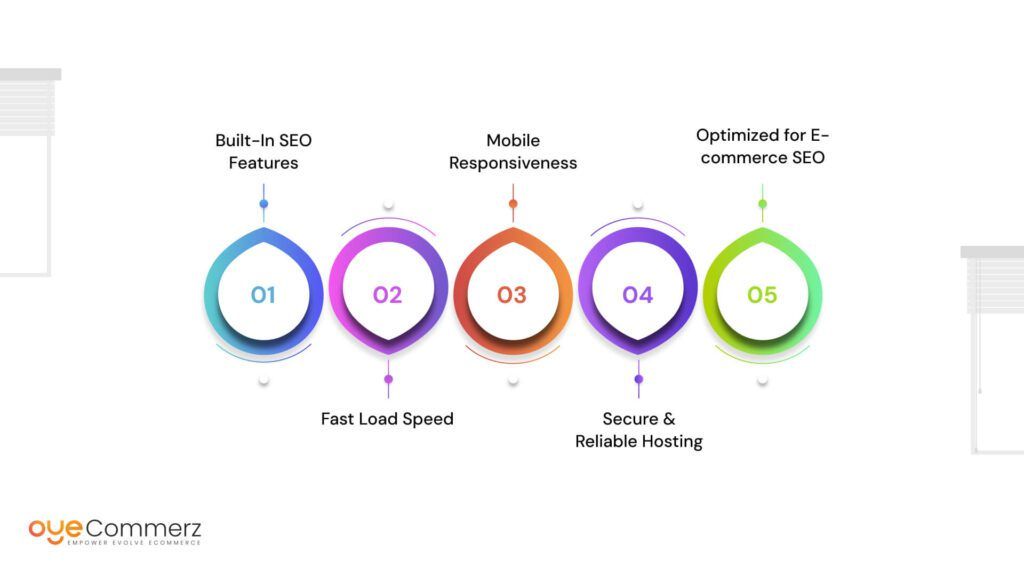
1. Built-In SEO Features:
Shopify comes with built-in SEO tools that make it easy to optimize your website, even if you’re not an SEO expert. You can easily customize essential SEO elements like title tags, meta descriptions, and alt text for images. Shopify also generates automatic sitemaps, ensuring search engines can efficiently crawl and index your site. These features save time and help improve your search rankings with minimal effort.
2. Fast Load Speed:
Shopify’s hosting is optimized for speed, which is crucial for SEO. A fast-loading website not only improves user experience but also plays a significant role in search engine rankings. Shopify’s performance is consistently good out of the box, and its infrastructure is designed to ensure your site loads quickly, even as you scale, which helps you retain visitors and perform better in search results.
3. Mobile Responsiveness:
Google prioritizes mobile-friendly websites for ranking, and Shopify makes this easy by offering mobile-optimized themes. All Shopify themes are designed to be responsive, ensuring your store looks great and functions well on all devices. This mobile-first design boosts your SEO rankings, as Google uses mobile-first indexing, meaning it ranks the mobile version of your site higher in search results.
4. Secure & Reliable Hosting:
Shopify provides SSL certificates and secure hosting as part of its package. This is important for SEO because Google prioritizes secure websites in search results. Having an SSL certificate not only helps with SEO but also builds trust with customers, which is crucial for an e-commerce store. Shopify’s reliable hosting ensures that your site stays up and running without interruptions, further benefiting your SEO performance.
5. Optimized for E-commerce SEO:
Shopify is specifically designed for e-commerce businesses, and its SEO features reflect that. It includes optimized functionalities for product pages, large catalogs, and collection pages, all of which are essential for ranking in search results. Shopify makes it easy to manage SEO for individual products and categories, helping you target a wide range of keywords related to your products. This makes it an excellent choice for businesses with extensive product offerings looking to boost their e-commerce SEO.
Ready to Boost Your SEO on Shopify? Let’s Find the Right Solution for Your Business!
At Oyecommerz, we specialize in helping businesses like yours get the most out of Shopify’s powerful SEO tools. Whether you’re looking for a user-friendly, all-in-one solution or need guidance on optimizing your Shopify store, we’re here to support your goals.
Not sure if Shopify is the best fit for your business?
Schedule a free consultation or an audit with us today! We’ll evaluate your current strategy, understand your SEO needs, and provide recommendations to help you make the right choice.
Get in touch with Oyecommerz today, and let’s drive your online success with Shopify!
Contact to Migrate your Magento Site to Shopify Now
Conclusion
When deciding between WordPress and Shopify for your website, understanding their strengths and weaknesses in terms of SEO is crucial to making the right decision for your business. Regardless of which platform you choose, the key to SEO success lies in a strong strategy, consistent effort, and continuous optimization. Both WordPress and Shopify offer solid SEO capabilities, but achieving the best results will depend on how well you implement SEO best practices and keep your website updated and optimized over time. Consistent attention to your content, site structure, and user experience will ultimately drive long-term SEO success.

